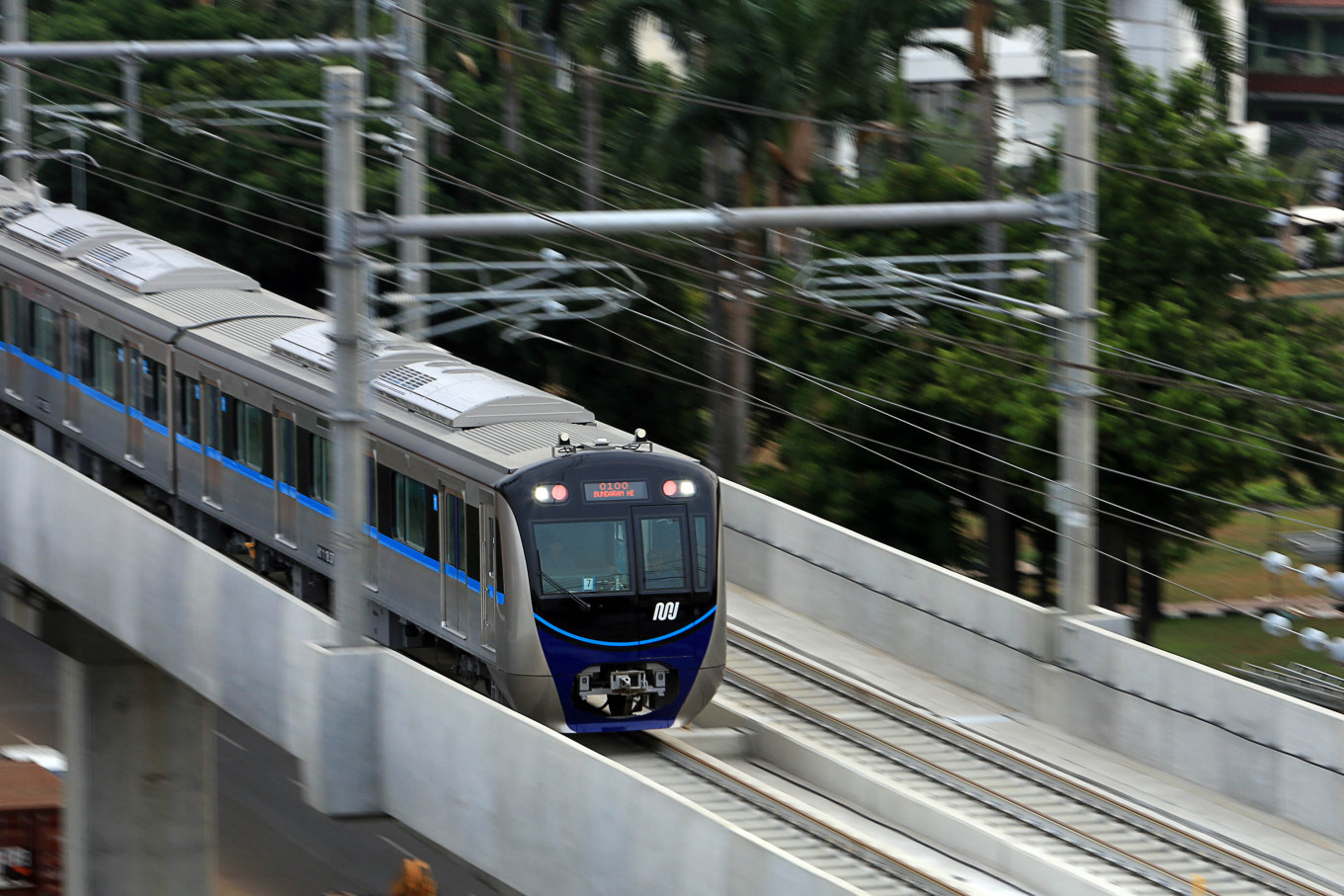Popular Reads
Top Results
Can't find what you're looking for?
View all search resultsPopular Reads
Top Results
Can't find what you're looking for?
View all search resultsAfter some humiliation, Japan’s MRT diplomacy pays off
Change text size
Gift Premium Articles
to Anyone
J
apanese media gave quite a lot of coverage to the excitement of Jakarta’s residents welcoming the operation of the long-awaited MRT. Asahi Shimbun, for instance, highlighted the behavior of passengers on the ultra-modern mode of transportation. For Japan, the launch of the mass rapid transportation system looks like “sweet” revenge for the country’s humiliating defeat in the race for the Jakarta-Bandung high-speed railway project four years ago.
Japan’s success in Jakarta is a convincing diplomatic victory because not only Jakartans but people in other provinces want to operate MRTs, which typify the modern metropolis around the world. The Jakarta MRT provides strong capital for Tokyo to boost its global role in providing high-tech modes of transportation to developing countries amid a tough challenge from China.
The tone of the media reports of the MRT’s operation was a reversal of the gloomy event in September 2015, when President Joko “Jokowi” Widodo shockingly awarded the Jakarta-Bandung high-speed train project to China. The Japanese public reacted in fury and disappointment and accused Jokowi of unfairly dropping Japan’s offer, just to please their archrival China.
At that time Coordinating Economic Minister Darmin Nasution summoned the Chinese envoy to Jakarta, Xie Feng, and Japanese Ambassador Yasuaki Tanizaki to his office. Darmin told the two diplomats the Indonesian government had decided to cancel the project for budget constraints.
To Japan’s dismay, China eventually secured the project after it submitted a new proposal. The megaproject is now underway and there is no doubt about China’s capability and capacity to complete the project as promised.
In an Indonesian-Japanese bilateral meeting on the sidelines of the East Asia Summit in Kuala Lumpur in November 2015, Japanese Prime Minister Shinzo Abe bluntly expressed his disappointment with Jokowi’s favoring of China. Abe said he strongly believed Japan’s offer was superior to China’s in terms of technology and financing.
The prime minister also emphasized the importance of “a relationship of trust and transparency in procedures” and called for “a shared understanding on these matters for future cooperation”.
Amid the MRT hype that has now lasted for about two weeks, Jakartans thronged to stations to get a free ride and politicians jostled each other for the credit of making the MRT come true. They pay little attention to the key role Japan has played. Few care that Japan has transferred its masterful MRT technology and management to Jakarta. That happens perhaps because we think the MRT project was just a business matter. We paid Japan (with borrowed money) to build our dream MRT — as simple as that.
In his speech inaugurating the 15.7-kilometer MRT track that connects Lebak Bulus in South Jakarta and the Hotel Indonesia traffic circle in Central Jakarta, President Jokowi said “the [MRT] is part of a new culture because this is the first in Indonesia”.
Jokowi could have shown a token of appreciation for Japan’s leading role, but he appeared to focus on how to take advantage of the MRT for his reelection bid. He simply wasted a golden chance to woo Japan to do more to improve Indonesia’s transportation systems.
The first phase of the MRT project was funded by Japan’s Official Development Assistance (ODA) and Japan did its utmost to ensure it would trigger revolutionary changes to Jakarta’s mass transportation system.
Japanese Ambassador to Indonesia Masafumi Ishii, Japan’s vice minister of land, infrastructure, transportation and tourism, Yasuhiro Shinohara, and Japan International Cooperation Agency vice president Yasushi Tanaka were present during the MRT inauguration ceremony. However, they apparently avoided publicity, but I wish Japan would have showed off a little bit. They chose to stay behind the scenes, although I heard from a Japanese friend they actually expected more open appreciation from the Indonesian government.
On its official website on March 24, the Japanese Embassy said: “Japan has constructed the MRT system by utilizing our quality infrastructure technology and has seen the project to completion to enable us to celebrate today’s inauguration ceremony. In a parallel effort, Japan has proactively transferred our technology on site to Indonesia’s engineers and workers.”
It further said that “Japan will continue to contribute to Indonesia’s economic growth through the export of Japan’s quality infrastructure”.
“We’ve humiliated Japan on train project: What’s next?” I raised the question in a column on this newspaper not long after President Jokowi angered the Japanese public back in September 2015. Now, the MRT has restored Japanese pride.
China is a very important partner to cooperate with and has offered infrastructure projects that are attracting Indonesia, but Indonesia also needs Japan. Japanese culture, way of life, high-level discipline and high-tech products have long been adored here. Japanese cuisine is highly popular and shopping malls managed by Japanese companies are at the top of the favorites lists here.
As the largest member of ASEAN, Indonesia naturally is of high interest to Japan. The relationship, however, has been overshadowed by the rapid rise of China. It seems to me that now Indonesia tends to take Japan for granted. Japan itself also looks too cautious in reaching out to the public here, as indicated by its low profile in the MRT celebration.
Nevertheless, Japan’s MRT has won Indonesia’s heart. Its MRT diplomacy is paying off, amazingly.











